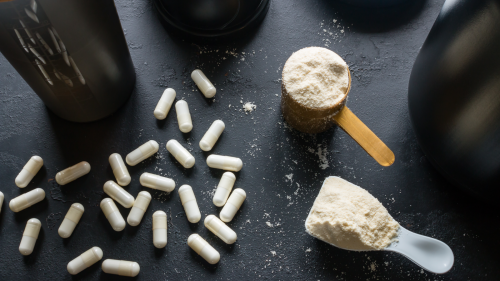Caution: Bodybuilding Products Can Be Risky

Your friends at the gym can’t say enough about the bodybuilding products they’ve been taking to help build muscle mass and strength. You wonder, are they all safe to use?
The U.S. Food and Drug Administration found some bodybuilding products may illegally contain steroids or steroid-like substances associated with potentially serious health risks which can be life-threatening. The FDA is aware of adverse event reports, including those showing evidence of serious liver injury.
In addition to liver injury, anabolic (tissue/muscle building) steroids and steroid-like substances have been associated with serious reactions such as:
- Severe acne
- Hair loss
- Altered mood
- Irritability
- Increased aggression
- Depression
- Sexual dysfunction
- Testicular shrinkage
They have also been associated with life-threatening reactions such as:
- Kidney damage
- Heart attack
- Stroke
- Pulmonary embolism (blood clots in the lungs)
- Deep vein thrombosis (blood clots that occur in veins deep in the body)
Many bodybuilding products are often promoted as hormone products and/or as alternatives to anabolic steroids for increasing muscle mass and strength. Many of these products make claims about the ability of the active ingredients to enhance or diminish androgen, estrogen, or progestin-like effects in the body, but actually contain anabolic steroids or steroid-like substances, synthetic hormones related to the male hormone testosterone.
Bodybuilding Products May Contain Steroids
The FDA found many of the bodybuilding products that illegally contain steroids and steroid-like substances, marketed online and in retail stores, are labeled as “dietary supplements,” even if they don’t meet the requirements to be labeled as such. The agency does not review dietary supplements for safety and effectiveness before they can be marketed; thus, products that are unlawfully marketed as dietary supplements are generally not discovered until after they end up on the market.
The potentially harmful, sometimes even hidden, ingredients in some bodybuilding products are concerning. The companies making these products are breaking the law and exploiting easily accessible marketplaces, including on websites and social media accounts, to get these products directly to consumers. In the end, it’s consumers who may not understand the risks who are put in harm’s way by taking dangerous ingredients in some of these products promoted as having miraculous results.
Some who use bodybuilding products also engage in “stacking,” which is when a person uses two or more bodybuilding products at once, including stimulants or products providing false assurances of liver protection, to enhance results or “gains.” These products should be a red-flag for consumers, especially when they are promoted by and purchased from the same dealer. These combinations, in addition to products with harmful or hidden ingredients, may put consumers at greater risk for serious and life-threatening reactions.
What to Do
If you’re taking any bodybuilding products that claim to contain steroids or steroid-like substances, the FDA recommends you immediately consult your health care professional because of the potentially serious health risks associated with using them and because of dangerous withdrawal problems that can arise from quickly ceasing the use of such products.
The agency also recommends that you:
- Talk to your health care professional about any bodybuilding products or ingredients you have taken, or are planning to take, particularly if you are uncertain about those ingredients.
- Talk to your health care professional if you are experiencing symptoms possibly associated with these products, particularly nausea, weakness or fatigue, fever, abdominal pain, chest pain, shortness of breath, jaundice (yellowing of the skin or whites of the eyes), or brown or discolored urine.
Taking Action
FDA can pursue regulatory and enforcement actions against sellers of these illegal products. However, this can be challenging, particularly when some sellers operate exclusively online. Company names or websites often are easily changed, or products can be relabeled to evade authorities and scam consumers.
The FDA encourages consumers and health care professionals to report adverse events or serious side effects related to the use of these products to the FDA’s MedWatch Safety Information and Adverse Event Reporting Program (MedWatch) or to the Safety Reporting Portal. Also, consumers can report any potentially unlawful products they find online to the FDA’s online reporting system.

